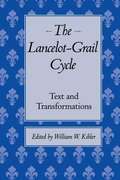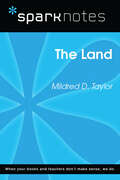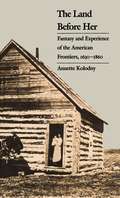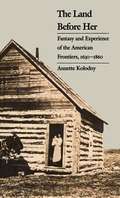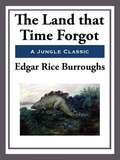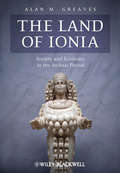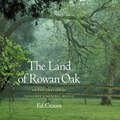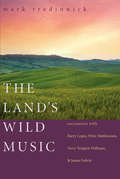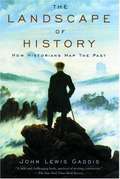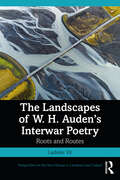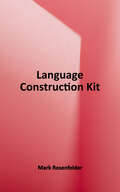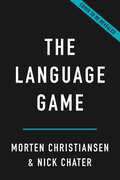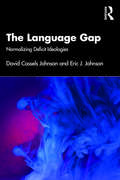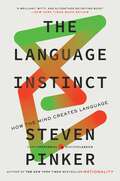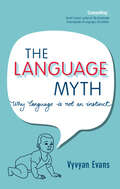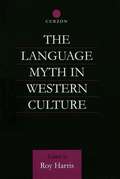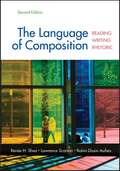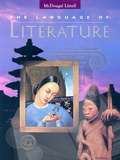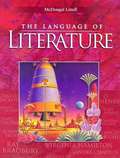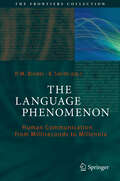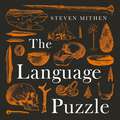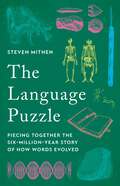- Table View
- List View
The Lancelot-Grail Cycle: Text and Transformations
by William W. KiblerComposed in Old French between about 1220 and 1240, the Lancelot-Grail Cycle is a group of five prose romances centered on the love affair between Lancelot and Guenevere. It consists of an immense central core, the Lancelot Proper, introduced by The History of the Holy Grail and The Story of Merlin and concluded by The Quest for the Holy Grail and The Death of Arthur. <P><P> This volume brings together thirteen essays by noted scholars from the first symposium ever devoted exclusively to the Lancelot-Grail Cycle. Exploring the cycle's evolution across the literatures of medieval France, Italy, Spain, Catalonia, and England, the authors take a variety of approaches that highlight a broad range of cultural, social, historical, and political concerns and offer a comparative and interdisciplinary vision of this great romance.
The Land (SparkNotes Literature Guide Series)
by SparkNotesThe Land (SparkNotes Literature Guide) by Mildred D. Taylor Making the reading experience fun! Created by Harvard students for students everywhere, SparkNotes is a new breed of study guide: smarter, better, faster. Geared to what today's students need to know, SparkNotes provides: *Chapter-by-chapter analysis *Explanations of key themes, motifs, and symbols *A review quiz and essay topicsLively and accessible, these guides are perfect for late-night studying and writing papers
The Land Before Her
by Annette KolodnyTo discover how women constructed their own mythology of the West, Kolodny examines the evidence of three generations of women's writing about the frontier. She finds that, although the American frontiersman imagined the wilderness as virgin land, an unspoiled Eve to be taken, the pioneer woman at his side dreamed more modestly of a garden to be cultivated. Both intellectual and cultural history, this volume continues Kolodny's study of frontier mythology begun in The Lay of the Land.
The Land Before Her: Fantasy and Experience of the American Frontier 1630-1860
by Annette KolodnyPreface The purpose of this study is to chart women's private responses to the successive American frontiers and to trace a tradition of women's public statements about the west. The attention accorded letters and diaries should not suggest that this is a study of the daily lives of pioneer women, however. Nor should the analysis of three centuries of published materials suggest that I have attempted any definitive literary history. Although I have made extensive use of letters and diaries composed between 1630 and 1860, I have not attempted a revisionist history of the westward movement as seen through the eyes of women. Such a history is nonetheless long overdue, and I sincerely hope my chapters may encourage further work toward that end. In that event, my contribution may be the reminder that white women began as pioneers to this continent in the seventeenth century. Only by acknowledging the fullness of that history will we be able to grasp the continuities linking later generations with what had gone before.
The Land That Time Forgot
by Edgar Rice BurroughsThis anthology is a thorough introduction to classic literature for those who have not yet experienced these literary masterworks. For those who have known and loved these works in the past, this is an invitation to reunite with old friends in a fresh new format. From Shakespeare s finesse to Oscar Wilde s wit, this unique collection brings together works as diverse and influential as The Pilgrim s Progress and Othello. As an anthology that invites readers to immerse themselves in the masterpieces of the literary giants, it is must-have addition to any library.
The Land of Ionia: Society and Economy in the Archaic Period
by Alan M. GreavesIncorporating over a century of archaeological research, Greaves offers a reassessment of Archaic Ionia that attempts to understand the region within its larger Mediterranean context and provides a thematic overview of its cities and people. Seeks to balance the Greek and Anatolian cultural influences at work in Ionia in this important period of its history (700BC to the Battle of Lade in 494BC) Organised thematically, covering landscape, economy, cities, colonisation, warfare, cult, and art Accesses German and Turkish scholarship, presenting a useful point of entry to the published literature for academics and students
The Land of Rowan Oak: An Exploration of Faulkner's Natural World
by Ed CroomThe plants and landscape at Rowan Oak are the “little postage stamp of soil” that William Faulkner owned, walked, and tended for over thirty years during the writing of many of his short stories and novels. Faulkner saw and smelled the earth and listened to sounds from the cultivated grounds and the surrounding woods. This is the place that offered him refuge for writing and provided him food from its garden, fruit and nut trees, and pasture for his horses and a milk cow. Rowan Oak boasts a diverse landscape, encompassing an aristocratic eastern redcedar-lined drive and walk as well as hardy ornamental shrubs, trees, pastures, and a hardwood forest with virgin timber. More than fifty years after Faulkner's death, Rowan Oak remains a sanctuary and a place of mystery and beauty nestled in the midst of Oxford, Mississippi. The photographs in The Land of Rowan Oak are botanist Ed Croom's exploration and documentation of the changes in the plants and landscape over more than a decade. Croom encountered early morning mists, the summer heat and haze, and even rare snowfalls in his near-daily walks on the grounds. His photographs record a decaying fence line, trees and plants that have since disappeared, and the newly restored sunken garden. This book honors the land Faulkner loved. While Faulkner's novels have left an indelible legacy in southern and American letters, the landscape of his beloved home also serves as a record of the botanical history of this most storied corner of the American literary South.
The Land's Wild Music
by Mark TredinnickAt the heart of The Land's Wild Music is an examination of the relationship between writers and their. Interviewing four great American writers of place - Barry Lopez, Peter Matthiessen, Terry Tempest Williams, and James Galvin - author Mark Tredinnick considers how writers transmute the power of nature into words. Each author is profiled in a separate chapter written in rich, engaging prose that reads like the best journalism, and Tredinnick concludes with his own thoughts on what it takes to be "an authentic witness of place."
The Land's Wild Music
by Mark TredinnickAt the heart of The Land's Wild Music is an examination of the relationship between writers and their. Interviewing four great American writers of place - Barry Lopez, Peter Matthiessen, Terry Tempest Williams, and James Galvin - author Mark Tredinnick considers how writers transmute the power of nature into words. Each author is profiled in a separate chapter written in rich, engaging prose that reads like the best journalism, and Tredinnick concludes with his own thoughts on what it takes to be "an authentic witness of place."
The Landscape of History: How Historians Map the Past
by John Lewis GaddisWhat is history and why should we study it? Is there such a thing as historical truth? Is history a science? One of the most accomplished historians at work today, John Lewis Gaddis, answers these and other questions in this short, witty, and humane book. The Landscape of History provides a searching look at the historian's craft, as well as a strong argument for why a historical consciousness should matter to us today. Gaddis points out that while the historical method is more sophisticated than most historians realize, it doesn't require unintelligible prose to explain. Like cartographers mapping landscapes, historians represent what they can never replicate. In doing so, they combine the techniques of artists, geologists, paleontologists, and evolutionary biologists. Their approaches parallel, in intriguing ways, the new sciences of chaos, complexity, and criticality. They don't much resemble what happens in the social sciences, where the pursuit of independent variables functioning with static systems seems increasingly divorced from the world as we know it. So who's really being scientific and who isn't? This question too is one Gaddis explores, in ways that are certain to spark interdisciplinary controversy. Written in the tradition of Marc Bloch and E. H. Carr,The Landscape of History is at once an engaging introduction to the historical method for beginners, a powerful reaffirmation of it for practitioners, a startling challenge to social scientists, and an effective skewering of post-modernist claims that we can't know anything at all about the past. It will be essential reading for anyone who reads, writes, teaches, or cares about history.
The Landscapes of W. H. Auden’s Interwar Poetry: Roots and Routes (Perspectives on the Non-Human in Literature and Culture)
by Ladislav VítThis is the first book-length study foregrounding Auden’s sense of place as a means for enhancing our grasp of this crucial twentieth-century poet. Proposing that Auden had a remarkable spatial sensibility, this book concentrates on his treatment of his homeland England, as well as the North Pennines and Iceland, both of which served as his ‘good’ places, ‘holy’ grounds and sources of topophilic sentiment. The readings draw on the scholarship of humanistic geography, tracing patterns of mental constructs which emerge from spatial experience. In a scholarly but engaging way, this book argues that focusing on Auden’s poetics of place as it emerged and evolved can be instrumental to our understanding of this influential poet not only in relation to his epoch but also to the Anglophone poetic tradition. Precisely because of his stature, these elaborations on Auden’s preoccupation with places, escapism, borders and local identity promise to enrich our understanding of the cultural and intellectual climate of the interwar period, when established notions of local places and cultures were beginning to be contested by internationalisation. This study will be of interest to both academics and students in the field of Anglophone literary studies while also appealing to those attracted to Auden’s poetry, interwar culture and the literary representation of space.
The Landscapes of the Sublime, 1700–1830
by Cian DuffyThe Landscapes of the Sublime examines the place of the 'natural sublime' in the cultural history of the eighteenth century and Romantic period. Drawing on a range of scholarship and historical sources, it offers a fresh perspective on the different species of the 'natural sublime' encountered by British and European travellers and explorers.
The Language Construction Kit
by Mark RosenfelderCreate plausible and realistic languages for RPGs, fantasy and science fiction, movies or video games, or international communication... or just learn about how languages work from an unusual, light-hearted perspective. The Language Construction Kit on zompist.com has helped a generation of conlangers to understand and create languages. It's expanded here with coverage of semantics and pragmatics, language families, writing systems, and sample wordlists, as well as an annotated sample grammar. Second revised edition (1.2).
The Language Game: How Improvisation Created Language and Changed the World
by Nick Chater Morten H. ChristiansenForget the language instinct—this is the story of how we make up language as we go Language is perhaps humanity&’s most astonishing capacity—and one that remains poorly understood. In The Language Game, cognitive scientists Morten H. Christiansen and Nick Chater show us where generations of scientists seeking the rules of language got it wrong. Language isn&’t about hardwired grammars but about near-total freedom, something like a game of charades, with the only requirement being a desire to understand and be understood. From this new vantage point, Christiansen and Chater find compelling solutions to major mysteries like the origins of languages and how language learning is possible, and to long-running debates such as whether having two words for &“blue&” changes what we see. In the end, they show that the only real constraint on communication is our imagination.
The Language Gap: Normalizing Deficit Ideologies
by Eric J. Johnson David Cassels JohnsonThe Language Gap provides an accessible review of the language gap research, illuminating what we know and what we do not know about the language development of youth from working and lower socioeconomic classes. Written to offer a balanced look at existing literature, this text analyzes how language gap research is portrayed in the media and how debatable research findings have been portrayed as common sense facts. This text additionally analyzes how language gap research has impacted educational policies, and will be the first book-length overview addressing this area of rapidly growing interest.
The Language Instinct: How The Mind Creates Language
by Steven Pinker"A brilliant, witty, and altogether satisfying book." — New York Times Book ReviewThe classic work on the development of human language by the world’s leading expert on language and the mindIn The Language Instinct, the world's expert on language and mind lucidly explains everything you always wanted to know about language: how it works, how children learn it, how it changes, how the brain computes it, and how it evolved. With deft use of examples of humor and wordplay, Steven Pinker weaves our vast knowledge of language into a compelling story: language is a human instinct, wired into our brains by evolution. The Language Instinct received the William James Book Prize from the American Psychological Association and the Public Interest Award from the Linguistics Society of America. This edition includes an update on advances in the science of language since The Language Instinct was first published.
The Language Myth
by Vyvyan EvansLanguage is central to our lives, the cultural tool that arguably sets us apart from other species. Some scientists have argued that language is innate, a type of unique human 'instinct' pre-programmed in us from birth. In this book, Vyvyan Evans argues that this received wisdom is, in fact, a myth. Debunking the notion of a language 'instinct', Evans demonstrates that language is related to other animal forms of communication; that languages exhibit staggering diversity; that we learn our mother tongue drawing on general properties and abilities of the human mind, rather than an inborn 'universal' grammar; that language is not autonomous but is closely related to other aspects of our mental lives; and that, ultimately, language and the mind reflect and draw upon the way we interact with others in the world. Compellingly written and drawing on cutting-edge research, The Language Myth sets out a forceful alternative to the received wisdom, showing how language and the mind really work.
The Language Myth in Western Culture (Routledge Advances in Communication and Linguistic Theory #2)
by Roy HarrisThe basic claim of this book is that for 2000 years and more the western tradition has relied on two very dubious assumptions about human communication: that each national language is a unique code and that linguistic communication consists in the utilization of such codes to transfer messages from mind to mind.
The Language Of Composition: Reading, Writing, Rhetoric
by Lawrence Scanlon Robin Aufses Renee SheaThe Language of Composition is the first textbook built from the ground up to help students succeed in the AP English Language course. Written by a team of experts with experience in both high school and college, this text focuses on teaching students the skills they need to read, write, and think at the college level. With practical advice and an extensive selection of readings -- including essays, poetry, fiction, and visual texts --The Language of Composition helps students develop the key skills they must master to pass the course, to succeed on the AP Exam, and to prepare for a successful college career. Revised based on feedback from teachers across the country, the second edition promises to be an even better resource for the AP Language classroom.
The Language Of Literature
by Arthur N. Applebee Sheridan Blau Andrea B. Bermudez Rebekah CaplanHow do you learn best? Do you prefer to work alone or with the help of a friend? In this book, you are presented with a variety of learning opportunities that allow you to chart the course to your own success, whether your strengths lie mainly in written, oral, dramatic, or artistic activities. In addition, you will collaborate with classmates to share ideas, improve your writing, and make connections to other subject areas. You may even use technological tools such as the Laserlinks and the Writing Coach software program to further personalize your learning.
The Language Of Literature (McDougal Littell Language Of Literature Series)
by Arthur N. Applebee Sheridan Blau Andrea B. Bermudez Rebekah Caplan McDougal-Littell Publishing StaffThe Language Of Literature
The Language Of Literature: The Interactive Reader Plus For English Learners
by Mcdougal LittellThe InterActive Reader Plus is a new kind of literature book.<P> Includes literature text, help for reading, vocabulary support, and skillbuilder pages<P> Special additional features include section summaries, more about..., What does it mean?, English Learner Support, and Reading Checks.
The Language Phenomenon
by K. Smith P. M. BinderThis volume contains a contemporary, integrated description of the processes of language. These range from fast scales (fractions of a second) to slow ones (over a million years). The contributors, all experts in their fields, address language in the brain, production of sentences and dialogues, language learning, transmission and evolutionary processes that happen over centuries or millenia, the relation between language and genes, the origins of language, self-organization, and language competition and death. The book as a whole will help to show how processes at different scales affect each other, thus presenting language as a dynamic, complex and profoundly human phenomenon.
The Language Puzzle: How We Talked Our Way out of the Stone Age
by Steven MithenThe relationship between language, thought and culture is of concern to anyone with an interest in what it means to be human.The Language Puzzle explains how the invention of words at 1.6 million years ago began the evolution of human language from the ape-like calls of our earliest ancestors to our capabilities of today, with over 6000 languages in the world and each of us knowing over 50,000 words.Drawing on the latest discoveries in archaeology, linguistics, psychology, and genetics, Steven Mithen reconstructs the steps by which language evolved; he explains how it transformed the nature of thought and culture, and how we talked our way out of the Stone Age into the world of farming and swiftly into today's Digital Age.While this radical new work is not shy to reject outdated ideas about language, it builds bridges between disciplines to forge a new synthesis for the evolution of language that will find widespread acceptance as a new standard account for how humanity began.
The Language Puzzle: Piecing Together the Six-Million-Year Story of How Words Evolved
by Steven MithenA top scholar reveals the most complete picture to date of how early human speech led to the languages we use today The emergence of language began with the apelike calls of our earliest ancestors. Today, the world is home to thousands of complex languages. Yet exactly how, when, and why this evolution occurred has been one of the most enduring—and contentiously debated—questions in science. In The Language Puzzle, renowned archaeologist Steven Mithen puts forward a groundbreaking new account of the origins of language. Scientists have gained new insights into the first humans of 2.8 million years ago, and how numerous species flourished but only one, Homo sapiens, survives today. Drawing from this work and synthesizing research across archaeology, psychology, linguistics, genetics, neuroscience, and more, Mithen details a step-by-step explanation of how our human ancestors transitioned from apelike calls to words, and from words to language as we use it today. He explores how language shaped our cognition and vice versa; how metaphor advanced Homo sapiens&’ ability to formulate abstract concepts, develop agriculture, and—ultimately—shape the world. The result is a master narrative that builds bridges between disciplines, stuns with its breadth and depth, and spans millennia of societal development. Deeply researched and brilliantly told, The Language Puzzle marks a seminal understanding of the evolution of language.
